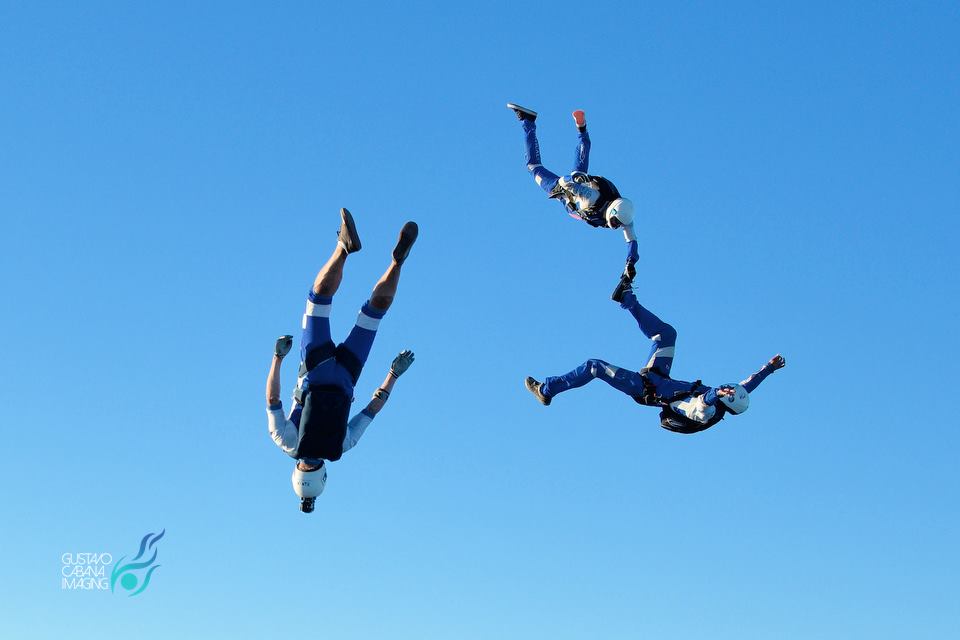
Image by Gustavo Cabana
Looking back across a season of high profile competitions and seeing professional teams across many different disciplines throw down their best performances can have a powerful effect on the imagination. The pull towards the ziggurat of organised competition can be strong - but what you ultimately witness is the end product of a lot of time and effort, so it important to know exactly what you might be getting into and addressing some front-end considerations will help you get on the good foot.
What really goes into starting a skydiving team? What are the advantages and rewards in the immediate future and then further on down the road? Also, what are the costs and compromises - both obvious and perhaps less so?
There are different ways of making a team happen. Some countries have a national skydiving organisation that plays an active role in the selection and training of talented individuals for the purpose of competition (e.g. France - who recognise parachuting as a national sport), although the more normalised method is whatever body controls the skydiving interests in your country will have an application method for allocating support to functioning teams with a valid performance history - which means at the beginning and for the foreseeable future you are likely on your own.
Other possibilities exist: Private coaching operations such as Satori Academy (www.teamsatori.co.uk) conduct season-long programmes in which a pool of students are seeded into teams of appropriate skill with the intention of building towards competition. Also sometimes already established teams might lose a member (for any number of reasons) and seek a replacement via. application and/or audition. However, by far the most probable beginning is that you and a group of friends that regularly jump together and socialise in the same circles will pass the idea around a bit and have things grow from there. You are practically a team already right? All you need is a cool name and some matching shit and glory awaits. Right?

Image by Simon Brentford
Now What?
The first thing that happens once you commit is you will become filled with motivation. Outwardly nothing has changed - you are the same gaggle of mismatched skydivers you were this morning, yet now you have a purpose! The machinery inside your head will be whirring and whizzing about all the things you might achieve.
The clearest immediate payoff from the decision to compete is this sense of purpose. It is very easy to get lazy when skydiving and fall into patterns of the same comfortable familiar behaviour - always flying your strong ways, always swooping the same direction - never training the wonky side or pushing yourself forward. Having the date of your first competition marked on a calendar by which you have to achieve specific things is a really good method to highlight how much more you could be getting out of your jumps right now - and the extra things you could be learning around the edges from all the different sources of information available out there. Also - the format and structure of competitions themselves are are designed to test your range of ability. The various dive pools for FS or VFS (and MFS!), the compulsory moves for Artistics and the indoor ruleset cover the full range of movement you have been using for your casual flying. Learning and practicing these will strengthen your knowledge and draw attention to weak areas where you need focus and improve.

Image by Jim Harris
Things To Consider:
It is easy to get excited about all of the great things you are going to achieve. Your new teammates might all be present and correct for the boozy bar talk of world domination, but how much is everyone really committed to the idea? When it comes down to the early starts on cold mornings is everybody going to actually be there? Also, the way you interact is going to change. The kind of mistakes that make for fun stories over a weekend of jumping might well create tension and arguments when there is more on the line. Competing can bring many rewards and be a lot of fun but it is also hard work. By introducing a formal element into your skydiving you risk making it into just that - work. Examine why it is that you skydive and have the others do the same. What do you realistically hope to achieve from teaming up? What are the trade-offs exactly? You could see it as being more serious across the board in return for deeper rewards, or a motivating way to throw money at your passion and improve much faster than before.
Team skydiving is worth the effort for many reasons, so if you are in a position to do so then don’t let any possible negative elements dissuade you - but examining potential hiccups and conflicts of interest early on can help everything to run smoothly from the beginning.

There are no comments to display.
Join the conversation
You can post now and register later. If you have an account, sign in now to post with your account.
Note: Your post will require moderator approval before it will be visible.